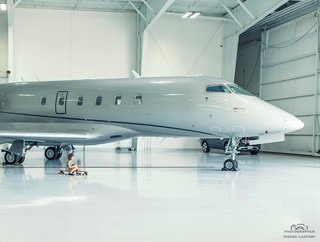Icarus Founder on Aviation’s Electric Path to Sustainability

The environmental impact of air travel is increasingly at the centre of debates. This leads figures in the industry like Kevin Singh, the Founder and President of Icarus Jet, to push for careful planning in the aviation field to take advantage of the opportunities presented by the shift towards electric power.
Unravelling the thoughts of the industry, Singh explains how firms are hedging their benefits of electric as a solution to aviation emissions reduction and considers the alternatives required to achieve full decarbonisation in a challenging industry.

Who is Kevin Singh?
Singh loves aviation and the things that come along with it: technology, the human experience of defying nature, and flying with mechanical wings.
After graduating high school in 1995, he received his commercial pilot certificate, followed by his CFI, CFII, and MEI. He was an avid freight dog flying the Bonanza and Cessna 400 aircraft series around Mount Shasta, Louisiana, and Texas. In the past, he has had the privilege of flying some of the finest private aircraft like the Beech Jet, Hawker 800 series, the Challenger 600, and the Global 5000/6000 series. He also served as an Instructor on the Hawker 800 and Challenger 600 programmes.
He believes success is achieved by investing in people. He also thinks that if you build, success will be limited. But, if you plant, success will grow to an endless boundary and provide the necessities for many generations. He started Icarus Jet in a two-bedroom apartment and has now expanded to three offices on three continents with several teams of employees.
How likely is electrification to be the decarbonised solution for aviation?
The aviation industry places significant bets on electric aircraft, as evidenced by United Airlines' substantial US$15mn investment in Eve Air Mobility, an emerging electric aviation startup. Simultaneously, NetJets, one of the largest global private jet operators, is gearing up to incorporate 150 electric Vertical Take-off and Landing (eVTOL) aircraft from Lilium Jet.
It would be premature to assert that either private or commercial aviation is fully prepared for the electrification leap while minimising the carbon footprint—with many pieces left to fall in place for a smooth transition. However, the assertion that private aviation, exemplified by industry leaders like Icarus Jet, is poised to make a significant impact on aviation's electric trajectory is well-founded. The unique characteristics of private aviation, coupled with consumer expectations, position it as an ideal candidate to power the electric revolution.
The prevailing consensus is that private aviation's key attributes, namely flexibility and access to remote locations, align seamlessly with the goals of the urban air mobility ecosystem. This ecosystem aims to provide agile and flexible transportation options within urban areas, serving as a connecting link for private jet flights—from downtowns to private terminals or for the final leg of a journey. Electric aircraft are anticipated to fulfil short to mid-distance transportation needs, with traditional fuel-powered or hybrid planes handling longer-haul flights.
Has the aviation industry already adopted sustainable solutions?
In the immediate term, the collaboration between private aviation entities and electric aircraft manufacturers is primarily focused on enhancing the passenger experience. Timesaving, a fundamental mission of private aviation, receives a significant boost from the ability to circumvent ground transportation at various stages of the journey—an added value appreciated by both the industry and its clients.
Electric aircraft manufacturers are currently developing diverse models for the urban and regional segments, with eVTOLs and Electric Short Take-Off and Landing (eSTOL) aircraft taking centre stage. While eVTOLs excel in operating within tight spaces due to their ability to take off and land vertically, eSTOLs, resembling conventional aeroplanes, require slightly more space for operation.

Is electric power a reliable solution for sustainable short-distance travel?
The power source for these electric aircraft is a subject of ongoing discussion, with a hybrid approach emerging as the most accepted solution, because achieving full electrification poses challenges related to range limitations and battery weight—critical considerations in aviation.
A viable complement to power aircraft generators is A1 jet fuel, offering the necessary boost for longer distances and, while it may not provide a complete solution to reducing carbon footprint, the existing infrastructure makes this fueling option the most practical in the short term.
Looking past the aspirations and envisioning the practicalities, investors are poised to seek tangible returns, necessitating the recapturing of development costs within the initial one or two decades. Although operational expenses are expected to be minimal, the aircraft themselves will carry a substantial price tag and depend exclusively on the existing global helicopter infrastructure.
How is the industry responding to the need for electrified aircraft?
An innovative venture named vPorts is strategically planning a facility in Dubai on a 25-year lease to serve as a central hub for these advanced aircraft, projecting an impressive US$7bn turnover over the lease period. This equates to an average of US$280mn per year or US$787,000 per day, even with a conservative estimate of 30 flights daily, resulting in approximately US$26,000 per departure.
To provide perspective, this revenue rivals SentientJet's entire annual earnings every other year, currently standing at US$500mn annually. The ambitious target for this transformative endeavour is set for 2045, with Lilium leading the charge by focusing initially on cargo and manufacturing 6-passenger machines. Despite the initial plans for further announcements in 2023, as of now, these publicly traded companies, having undergone SPAC mergers driven by private equity, remain reliant on positive media exposure to attract external investments.
Airbus introduced the CityAirbus concept in 2022, featuring an 80-kilometre range and a maximum flight duration of 40 minutes – highlighting the importance of infrastructure support for future developments, as emphasised by the aerospace giant.
In essence, the electrification of aviation is gaining traction through substantial investments and growing public interest. While larger aircraft will continue to operate longer-haul flights, the discussion surrounding how players in the private aviation sector can seamlessly integrate electric aircraft into their services is pivotal.
At Icarus Jet, we are already witnessing the potential of this transformation, enabling our clients to actively engage in the conversation towards fostering an electrified private aviation ecosystem.
*******************
Make sure you check out the latest edition of Sustainability Magazine and also sign up to our global conference series - Sustainability LIVE 2024.
*******************
Sustainability is a BizClik brand.






